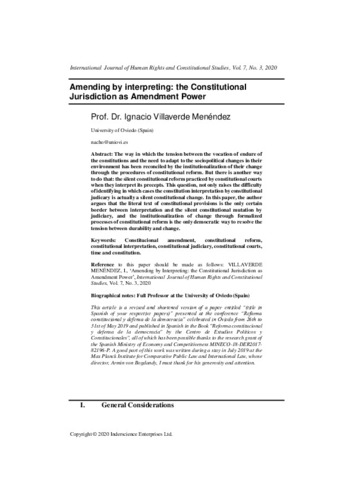Amending by interpreting: the constitucional jurisdiction as amendment power
Autor(es) y otros:
Palabra(s) clave:
Reforma constitucional y papel de los tribunales constitucionales
Fecha de publicación:
Versión del editor:
Citación:
Descripción física:
Resumen:
The way in which the tension between the vocation of endure of the constitutions and the need to adapt to the socio-political changes in their environment has been reconciled by the institutionalisation of their change through the procedures of constitutional reform. But there is another way to do that: the silent constitutional reform practiced by constitutional courts when they interpret its precepts. This question raises the difficulty of identifying in which cases the constitution interpretation by constitutional judiciary is actually a silent constitutional change. In this paper, the author argues that the literal text of constitutional provisions is the only certain border between interpretation and the silent constitutional mutation by judiciary, and the institutionalisation of change through formalised processes of constitutional reform is the only democratic way to resolve the tension between durability and change.
The way in which the tension between the vocation of endure of the constitutions and the need to adapt to the socio-political changes in their environment has been reconciled by the institutionalisation of their change through the procedures of constitutional reform. But there is another way to do that: the silent constitutional reform practiced by constitutional courts when they interpret its precepts. This question raises the difficulty of identifying in which cases the constitution interpretation by constitutional judiciary is actually a silent constitutional change. In this paper, the author argues that the literal text of constitutional provisions is the only certain border between interpretation and the silent constitutional mutation by judiciary, and the institutionalisation of change through formalised processes of constitutional reform is the only democratic way to resolve the tension between durability and change.
ISSN:
Patrocinado por:
Research grant of the Spanish Ministry of Economy and Competitiveness MINECO-18-DER2017-82196-P
Colecciones
- Artículos [37549]
- Derecho Público [506]
- Investigaciones y Documentos OpenAIRE [8420]
Ficheros en el ítem




